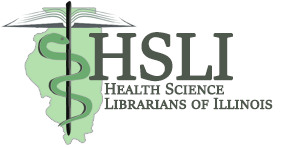(via Julie Dietrich, Blessing Health Professions Library)
The Health Science Librarians of Illinois (HSLI) will offer three-continuing education sessions at the annual virtual conference. Registration is still open! To register, go here. The deadline is Friday, October 22.
CE1: Charting a new course: practical data visualization for librarians presented by Annette Mendoza and Karen Gutzman
2 MLA CE
Data visualization is used to communicate complex information and explore trends in large sources of data. Compelling data visualization requires thoughtful planning and execution; from understanding the data, choosing the right chart, balancing visual cues, and providing narratives to tell interesting stories. This course gives attendees a strong foundation in the principles of data visualization. In addition, attendees will use Microsoft Excel, a common but incredibly powerful tool, to visualize library-relevant data through a series of hands-on activities. Attendees will gain practical and immediately useful skills for visualizing both qualitative and quantitative data.
CE2: Supporting Medical Education through Emerging Technologies and Innovation Services presented by Elisandro Cabada
No CE credit
In this session you will learn how the Library can support medical education through emerging technology services. See examples of how emerging tech is being applied in libraries throughout the nation and learn how to develop your own services. Gain insight into the fundamental question of “Why is the Library providing access to emerging tech?”
CE3: Evidence Based Medicine for Complementary, Alternative and Integrative Medicine (CAIM) presented by Peg (Margaret) Burnette
No CE credit
According to the National Institutes of Health, more than 30% of adults use non-conventional approaches to medical care. The terms “complementary” and “alternative” and “integrative” are commonly used to describe non-traditional medicine but there are distinctions. Complementary approaches are used in combination with conventional medicine and alternative approaches are used in place of traditional medicine. These therapies can include nutritional, physical, or psychological approaches and can be used in various combinations. Integrative medicine represents a coordinated strategy that includes both conventional and complementary approaches to health care.
These therapies are considered by some to be little hoaxes or snake oil, but are lifelines for others. And so, it is critical to consider these approaches through the lens of evidence-based medicine (EBM). This session will present the basics of CAIM and discuss the intersection of CAIM and EBM through an interactive case study. In this climate of mis- and dis-information, it is critical to consider the science to inform decision making for traditional, non-traditional, and integrated management or prevention in health care.
